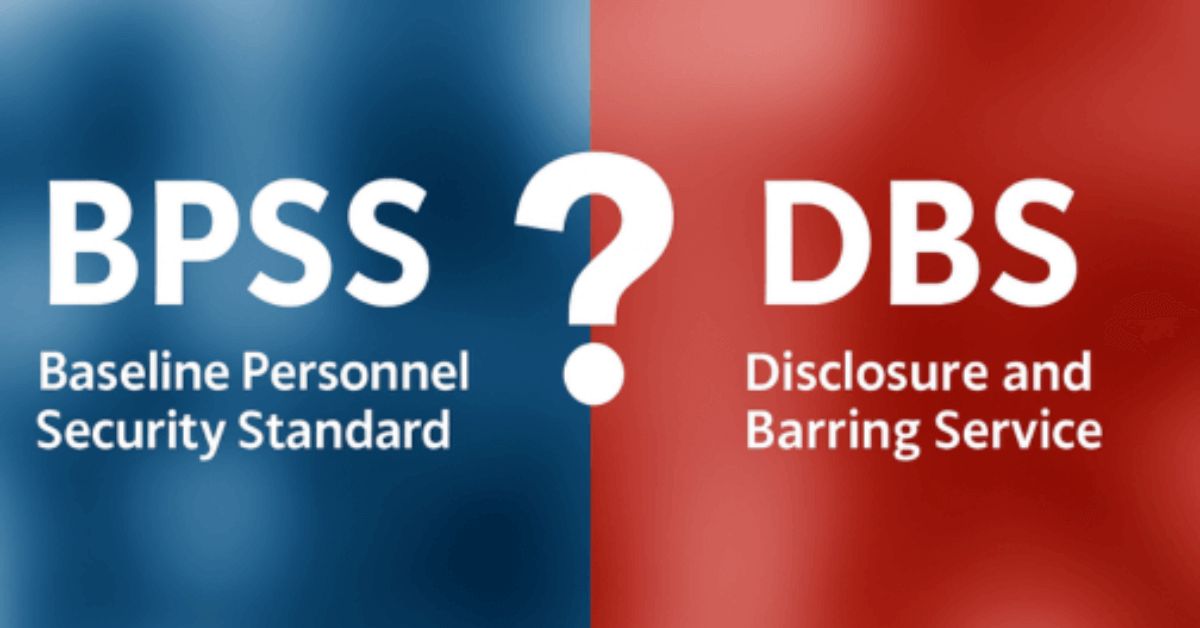When it comes to pre-employment screening in the UK, two terms often come up: BPSS and DBS. People frequently ask, Is BPSS the same as DBS? The short answer is no. While they are connected in certain ways, they serve different purposes and are used in different contexts. To properly understand their roles, it is important to explore the difference between BPSS and DBS in detail.
Table of Contents
ToggleWhat is BPSS?
BPSS stands for Baseline Personnel Security Standard. It is a type of background screening process introduced by the UK government. Its main purpose is to provide a foundation level of security clearance for individuals who want to work in roles related to government departments, the armed forces, or organisations handling sensitive public data.
The BPSS check is not limited to government staff. Many private companies, especially those working as contractors with the public sector, also use it to assess applicants before offering them employment.
The main elements of BPSS include:
- Identity verification: Checking documents such as passports, driving licences, or birth certificates to confirm an applicant’s identity.
- Right to work in the UK: Checking that the individual has lawful eligibility for employment in the UK.
- Employment history check: Reviewing the previous three years of employment or education history to spot inconsistencies or gaps.
- Criminal record check: Usually completed through a Basic DBS check.
As you can see, a criminal record check is a part of BPSS, and this is where DBS comes into the picture.
What is DBS?
DBS refers to the Disclosure and Barring Service check. It is a background check that focuses specifically on criminal records. Employers request a DBS check to assess if a candidate has any convictions, cautions, reprimands, or warnings on their record.
There are three main levels of DBS:
- Basic DBS: Shows unspent convictions only.
- Standard DBS: Provides a full overview of an individual’s criminal record, covering all convictions, cautions, and reprimands, whether spent or unspent.
- Enhanced DBS: Includes everything in the standard check, plus any relevant information held by local police.
People often link BPSS and DBS by pointing to the Basic DBS check, which is a component of the BPSS process.
BPSS vs DBS: Key Differences
So, are BPSS and DBS the same? The answer is no. While they are connected, they are not interchangeable. When considering BPSS vs DBS, it is helpful to look at the BPSS and DBS difference in terms of purpose, scope, and usage:
– Purpose: BPSS is a comprehensive pre-employment screening process, while DBS is a criminal record check.
– Scope: BPSS covers identity, right to work, employment history, and criminal records. DBS focuses exclusively on criminal history.
– Application: BPSS is required for many public sector roles and government contractors. DBS is required mainly for roles involving vulnerable groups (e.g. education, healthcare).
– Variations: BPSS is a single standard process, whereas DBS comes in Basic, Standard, and Enhanced levels.
In short, BPSS includes a Basic DBS as one of its checks, but a DBS check on its own does not equal BPSS clearance.
Why Does BPSS Include a DBS Check?
The government designed BPSS as a minimum security standard. One of its goals is to confirm that an individual does not pose a risk when handling sensitive information or working in certain environments.
Within BPSS, the Basic DBS provides insight into an individual’s criminal background. If recent convictions are revealed, employers may weigh this before confirming roles tied to security.
When Do You Need BPSS?
BPSS clearance is commonly needed in roles that:
- Involve access to government data systems.
- Require working in defence, aerospace, or security services.
- Covers roles that deal with personal or financial data within public sector bodies.
- They are connected to contracts with the UK government.
This type of screening is seen as the first level of national security vetting. Without BPSS clearance, individuals cannot move on to higher levels of security checks, such as Security Check (SC) or Developed Vetting (DV).
When Do You Need DBS?
DBS checks, on the other hand, are often required for roles involving direct interaction with vulnerable groups. For example:
- Teachers and school staff.
- Healthcare professionals.
- Social workers.
- Volunteers working with children or adults at risk.
While BPSS includes a Basic DBS, many employers in education, healthcare, or charity work may request Standard or Enhanced DBS checks, which provide more detailed information.
BPSS vs DBS: Final Thoughts
In summary, BPSS vs DBS highlights the fact that while BPSS includes a Basic DBS check, the two are not identical. BPSS is a full screening process that covers identity, right to work, employment history, and criminal records. DBS is a criminal record check, available at Basic, Standard, and Enhanced levels. BPSS includes a Basic DBS check, but completing a DBS on its own does not amount to BPSS clearance.
Both are vital in different employment situations. Knowing the difference between BPSS and DBS helps applicants and employers better understand which type of check is required for specific roles.
If you are applying for roles that require government or security clearance, getting your screening done correctly is important. Get connected with us today to have your BPSS checks done and gain the confidence of employers by securing your BPSS clearance.

